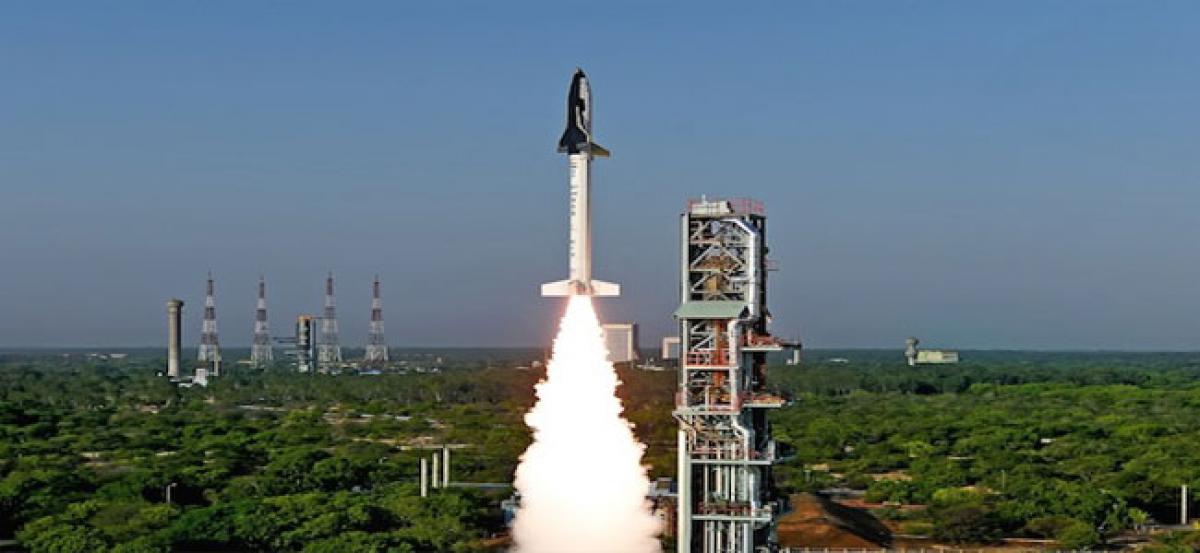Live
- ‘Get Set, Grow Summit 2024’ Focuses on Digital Detox for Families
- Stokes motivates his team to put in extra effort, says England pacer Potts
- From overcoming setbacks to leading India in U19 Women’s Asia Cup, Niki Prasad's amazing journey
- Driving Enterprise Security: Inside Venkata Reddy Thummala’s Leadership Journey
- Constitution debate: PM Modi hails 'Nari Shakti'; makes strong pitch for 'United Bharat’
- Abhijeet Bhardwaj: Revolutionizing Enterprise Analytics with Innovation and Expertise
- Bihar: Inquiry initiated against principal who went to buy veggies during school hours
- Press Sri Lankan Prez for release of Indian fishermen: TN Cong MP to EAM Jaishankar
- TN: DMK postpones executive meet due to heavy rains & Parliament session
- Porous silicon oxide electrodes can fix durability issues in batteries: Researchers
Just In

The Indian Space Research Organisation (ISRO) is ready with technologies needed for human space missions and only political clearance is needed, according to a senior professor.
New Delhi : The Indian Space Research Organisation (ISRO) is ready with technologies needed for human space missions and only political clearance is needed, according to a senior professor.
Delivering the spotlight address at the fourth ORF-Kalpana Chawla Space Dialogue here today, B N Suresh, Honorary Distinguished Professor of the ISRO, said as far as ISRO is concerned, its team is ready to undertake such missions.
This year's Dialogue was kicked off on Thursday night with the inaugural address by Lt. Gen. Amit Sharma, former Commander-in-chief, Strategic Forces Command and special address by Sunil Gupta, Secretary, Telecom Regulatory Authority of India. ORF Chairman Sunjoy Joshi delivered the welcome address.
Prof. Suresh said ISRO is now working on building the heavy lift launch vehicle that can lift five to eight tonnes of payload. These vehicles will be backed by highly powerful Cryo Engine Cluster .
He said the future plans of heavy lift launch vehicles are designed to allow India to launch reusable vehicles, heavy platforms and human space missions.
Looking at the growing use of small satellites, India is also working on a small satellite launch vehicle also, Prof Suresh said.
ISRO is also working on to master recovery of the space capsule and developing a reusable launch vehicle that would reduce the cost and allow reuse of the vehicle.
Prof. Suresh said all of India's launch capabilities are in sync with the civilian programme, but not defence.
He noted that from a scratch in the 1980s, India's space launch capabilities have improved exponentially to launch 104 satellites in one go.
Meanwhile, Lt. Gen. V G Khandare, former Director General of Defence Intelligence Agency, delivering another spotlight address on 'Utilisaton of Space for Military Purpose: A roadmap for India', underlined the need for India to develop capabilities to launch heavier space assets, to match China's capabilities.
He felt that China has an edge over India with more satellites and launch centres.
He also said India has a long way to go, needs to learn from its adversaries and be able to use its space capability as a deterrent for war and conflict.
In the inaugural address, Lt. Gen Amit Sharma said while militarisation of space is very difficult to stop, India should take an active role in stopping the weaponisation of space.
He said right now, there is also no clear clarity on what kind of weapons are prohibited in the space, as the treaty talks of only weapons of mass destruction. "Are kinetic weapons allowed? Are laser weapons allowed? Unfortunately, there is no clarity on these issues," he said.
Lt. Gen Sharma said with ISRO mastering the job of building satellites, this job should now be left to the private sector, and ISRO should concentrate on newer, tech-advanced areas.
He also stressed the need to build capability to look after the assets in space.
In his special address, TRAI Secretary Sunil Gupta said the open sky policies of his organisation is going to be further streamlined, noting that it believes in "technology neutral".
He also made it clear that the TRAI is against putting restrictions on foreign satellites just because they are foreign. "That is not the right way. We have to see what role these satellites play," he said.
Gupta also underlined the need for making satellite clearances much easier.
ORF Chairman Sunjoy Joshi noted that while the Indian space programme is already 40 billion dollars, the world commercial space market stands at 380 billion dollars. And it is expected to go up to at least 2.7 trillion dollars in the next three decades, according to Bank of America's Merrill Lynch.
Though the US holds more than 40% market share in this industry, the US successes has been coming not from NASA alone but from a dynamic, innovative private sector actively encouraged and promoted by NASA and the DOD, Joshi pointed out.
"Goldman Sachs today calls space the next investment frontier. And as this new race heats up, there will as always have winners and losers. Some countries will race to encourage private companies to literally rocket the sector forward far more vigorously and swiftly than would be the case if left to governments alone. Others will struggle with the regulatory frameworks in this area," Joshi said.
The three-day conference will see top scientists, policy-makers, practitioners, and all other stake-holders debate various topics and issues.
The valedictory address will be delivered tomorrow by Dr. V K Saraswat, now NITI Aayog Member and a former Director General of the DRDO and Scientific Advisor to the Defence Minister.

© 2024 Hyderabad Media House Limited/The Hans India. All rights reserved. Powered by hocalwire.com







